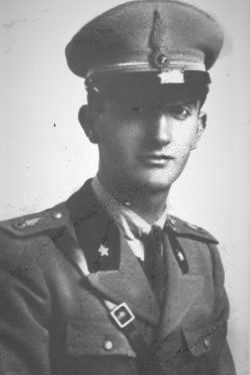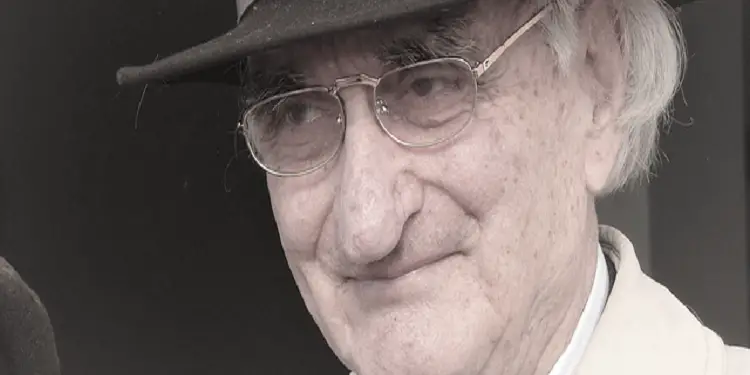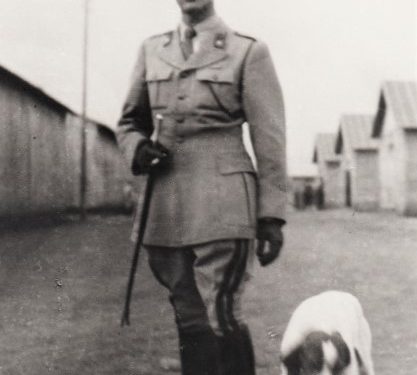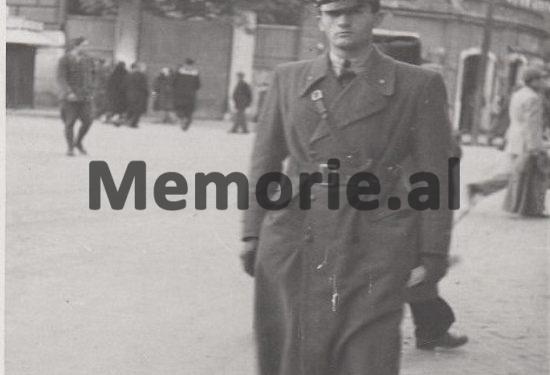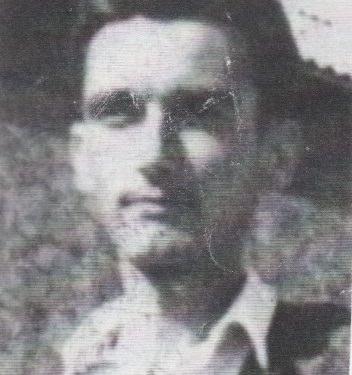By Lek Pervizi
Part One
The Odyssey of Innocence
The Homeland
When you enter Skuraj and cross the Urdhaza stream, the mountain climb begins, through the hill of the Lekbibajs. You pass three mills in a row, known as those of Gjin Pjetri, which stand one after the other. You also pass the two-story tower of Ndrec Pjetri, Gjin’s younger brother, and then you come across a rocky ridge on which stands a complex of three stone buildings, the historic towers known as the towers of Gjin Pjetër Pervizi of Skuraj, leader of the Kurbin uprising. These buildings dominate the entire valley, which is formed by the confluence of the Mat and Fan rivers (a branch of the Mat), up to Milot. It is almost a fortress that protects the area from the expeditions of foreign invading armies that could penetrate that gorge, until they met the wall of the Skuraj Mountains, where the towers we mentioned were erected.
The towers, which were burned from time to time by foreign invaders, mainly by the Turks, were rebuilt again. These stone buildings that stood on this rocky hill were recently burned twice in a row by the Turkish hordes, in 1881 and 1911. This stubborn Albanian tribe had rebuilt them even better than the first ones. From the west, the Mat river valley stretched, while from the east, the massif of the Skuraj mountains rose, dominated by Mali i Thatë, crowned by the peak of Lartishi. Further on, Trodhna e Pëshkashi rose, all covered in pine forests.
From the south stretched the Skanderbeg mountain ranges, which originated precisely in the mountain of Skuraj. From the north, the rocky mountain of Dërven rose, which included; Ferrë-Skuraj and Shkopet, where the ruins of an old fortress could be seen, that of Pervizi i Madh of Skuraj, a brave prince and commander, who fought against the Turkish army in those distant times. (The name of the Pervizi tribe came from a deep time, connected with ancient events and wars lost in the space of time, and remaining as a hazy memory in the minds of the inhabitants).
There, between Shkopet and the Lekbibajs’ hill, a narrow canyon was formed, which ended in the Gorge of Mat, from where the river burst with a rapid rush to spread calmly in the wide, sandy plain, where it joined the other river, Fan, which descended from the north, Kthella and Mirdita. From the very structure of nature, the towers of Gjin Pjetri took on the dimensions of a fortress of resistance, surrounded on two sides by the gorge of Urdhaza and that of Shkopet, which formed a triangle with the harsh mountains, in the middle of which stretched the ancient village of Skuraj, dominated by these towers surrounded by a giant rocky ridge.
The name of Pervizi is closely connected with that of Skuraj, as a place and as a lineage, since ancient times. A mountainous place with natural protection, Skuraj was also chosen by Gjergj Kastrioti as a strong base from which he undertook attacks on the Ottoman armies. Skuraj was once the center of the Skuraj principality, which ruled over the Kurbin region and ended with the Turkish invasion, after the death of Skanderbeg.
I made the description to give more meaning to the reason why we three brothers, were all born in Skuraj, and not in Tirana, Shkodra, or Kruja and Korça, or in a city of a foreign country, where the family had lived, from time to time. Our parent, although charged with important military duties and positions, paid great attention and priority to the preservation of traditions. Thus, he would send our mother, to those towers, whenever the time came to give birth to a child. First, this happened to Valentin, who was born in Skuraj, on July 1, 1920.
-“Where our ancestors have been born for centuries, there our children will be born too,” he had told his wife, since the first time. And so it happened with the second child Genci, and it continued until me, the third, the youngest and the last, Leka, the undersigned.
The First Years
Valentin spent his first years of childhood in the family circle, which had settled in Tirana, since 1924. There he was joined by the second brother, Genci, and after nine years, the third and youngest brother, Leka, the undersigned. When the “Naim Frashëri” school opened in 1926, Valentin started what is called the period of school education, and continued there until the third grade, where Genci also joined him, in the first grade.
We have to go back in time a little. A few years earlier, the political events in Albania had become tense, passing a little over earlier events, we move on to those of June 1924. My father, with the largest part of the selected officers of the army and gendarmerie, took the side of Zog, at that time prime minister and all of them went to Yugoslavia. My father sent my grandmother and mother with the two children, Valentin and Genci, (four and two years old) to Skuraj, to take shelter and hide there, to escape the persecution of the new Fanolist rulers.
The directive was given that the opponents’ houses should be burned and their families interned. This instruction is mentioned for the first time in this book, because that was what it really was, an instruction given surprisingly by Fan Noli himself, influenced by the policy of terror that was applied in Russia. The Fanolist forces reached the towers of Gjin Pjetri, but they didn’t find anyone in our residence. My grandmother and mother had left in a hurry with the children, and had hidden in the family’s huts.
It was the time when in Albania, manliness took the first place in social relations, and people would not lower themselves in any case. Later, this manliness would deteriorate, as badly as possible, along with the deterioration of the country, in a very confused state, which would open the way for very barbaric and inhuman actions and behaviors. Later!
In the case we mentioned, the commander had an order to burn the tower of Prenk Pervizi. Since the three towers, ours and two of our cousins, were stuck to each other, he did not do that gesture, so as not to damage the other two residences as well. He was satisfied with taking a ram from our livestock, which they roasted on a spit, to feed the soldiers.
After the crisis of 1924, the situation normalized again. The brothers continued primary school. They played ball all day, with their friends; among them Riza Llushta, who later became a famous footballer in Italy. Valentin would say that; Llushta, had drawn a circle on the wall with chalk and practiced throwing the ball inside the circle. In a ball game, Valentin, nine years old, falls and breaks his left arm and is urgently taken to the hospital.
This happened in the summer of 1929, when I was just born. His life and arm were in danger. All of Tirana was alarmed, with its small population, even King Zog himself, who intervened so that the operation would be performed by doctor Sinani, the best surgeon of the time in Albania, who was the doctor of the Royal Palace. The operation was successful, the arm was saved. After 23 years, that arm, where the red scar of the stitching, of about 20 cm, was visible, would become the reason to save him from another danger.
This time coincides with the rule of the four zone commanders (military governors), with the captains; Prenk Pervizi, Muharrem Bajraktari, Fiqri Dine and Hysni Dema, whom foreigners called the quadrumvirate (the rule of the four). This appointment was made by Ahmet Zogu himself, prime minister and president, who had divided Albania into four military administrative zones, keeping Prenk Pervizi in command of the central zone, with Tirana as the center. Thanks to these experienced and influential commanders, order and tranquility were established in Albania within a short time, and the economic development, urbanism and culture gained momentum.
Work opened everywhere, especially in the construction of the road network, from south to north, which did not exist at all, and in civil constructions where the first place was occupied by the construction of schools in every city and center. Turkey had left the country in a very great backwardness, worse than medieval. Movements in Albania were done on foot, with animals, carts and some primitive carriage. The cities were nothing but large villages, with ground-level houses made of adobe, with a primitive system, without any kind of hygienic structure. Darkness reigned, which was illuminated by kerosene lamps and in the village, by the pine torch and the fire of the fireplace.
It was the year 1929, my father, who had finished his five-year duty as zone commander of Tirana, left to attend the War School in Turin. On this occasion, he took the family there. His grandmother, my mother and the three of us children. My two brothers, Valentin and Genci, he sent to the ‘San Giovanni Bosco’ college, in Lanzo Torinese, where the children of the Savoy dynasty and other Italian and foreign nobles’ sons studied. I add that following his example, Captain Mark Kodheli, a colleague and friend of my father, had brought his two sons there.
I was almost two years old. During the time in Turin, I got closer to Valentin, who protected me from Genci’s teasing, who played with me like with a doll. Valentin remained my champion and hero, throughout my life. He was characterized by manly attitudes, even in childhood. At the same time, he was very loving towards the members of the family.
Especially towards our grandmother, he had an unlimited love and admiration. He respected my father immensely. My parent’s word for him was the word of God. He also loved my mother very much, who would stand up for him in many situations regarding our father, who was very strict even in the family, in addition to the army. Add to that the stories and legends about him, which Valentin heard from our social circle. These circumstances influenced his inclination towards the military uniform. With the successful completion of the Turin War School, my father was appointed as inspector of Albanian students in Italy and France.
He was promoted to Lieutenant Colonel and was stationed in Florence. As for the historical importance of the four zone commanders, the Englishman Julian Amery, who would become Lord Amery, would write and repeat several times in his book; “Sons of the Eagle”, already in the preface of the book, (Sons of the Eagle, p. 20), where he wrote: “…the new regime was established… thanks to the efforts of a quadrumvirate of the Geg chiefs. These were: Muharrem Bajraktari, Fiqri Dine, Prenk Pervizi and Xhemal Herri. These men followed Zog when he escaped to Yugoslavia, and played an important role in the uprising that took place.
Thanks to the fulfillment of their duties, they gained great influence. When they ended their service in favor of the royal cause, Zog broke their power, which one day could threaten him as well. In their place, he put new people, more obedient to the will of the King, because they were dependent on the privileges he gave them. Thus, in a period of five years, the Royal dictatorship became absolute.
In 1935, my father, a Lieutenant Colonel and staff major, returns to Albania and is assigned to a duty in Korça. This surprised the military circles and the civil society of the capital a lot. But why, to end up at the end of Albania in Korça, had he finished the Turin War School, and come out a staff major?! It seems that this transfer was made without the King’s knowledge, by the Ministry of Defense. But in that year, he comes back to Tirana, by order of Zog, and I (Leka), enter the first grade of primary school.
The brothers continued school in Italy, and came for the summer holidays in Albania. My father would take us to spend these holidays, in the highlands of Skuraj. In the mountain of Lartishi and Trodhna, of Pëshkashi. Beautiful and climatic places. With sources of mineral water. When I think about the natural beauties of Albania, which I had enjoyed and known since childhood, a great sadness takes over me, seeing how badly it deteriorated under the communist dictatorship, abandoned by all the good things that God had given it, to be a happy country, while it turned into an unfortunate country.
Our parent would take us for holidays to the mountains of Skuraj, to be hardened and to be connected to the foundation of the best Albanian traditions. Valentin was distinguished for his athletic-sporting abilities, such as; climbing rocky mountains, shooting with a rifle and; in hunting, in wrestling competitions with the young people of the area, and in other popular games, in which he excelled and gained a reputation, as a very agile boy. He was also a handsome and slender young man.
In these circumstances, our life flowed peacefully and regularly. From 1935, the family lived in Korça, where my father was the District Commander. This time coincides with a task that was entrusted to him, to represent Albania in a commission of international observers, who would closely follow the war in Abyssinia and right after this, the great maneuvers of Italy. In these two duties, he had the opportunity to stay close to the staffs of the famous Italian generals Badoglio and Graziani, where there were also staff major officers, his former friends at the Turin War School.
It was the summer of 1936. That year we spent the holidays in Korça, together with the children of prof. Luigj Muzhani, our age. Under Valentin’s leadership, we were engaged in completing two large albums with photographs on the war in Abyssinia and the long journey, back and forth, which constituted an important documentary presentation. Enriched with the reports that he had dedicated to those events. As well as the meetings with the Duce (Benito Mussolini) and the King of Italy.
With the foreign observers, with whom he shared that duty, with foreign staff major officers in the great maneuvers, and other photographs of that time. The photographs were accompanied by notes from my father, which constituted a description of that war and experience in a backward African country, as if in the Stone Age. Where no Albanian foot had ever stepped.
From these meetings he had understood very well, the danger that awaited Albania, after Abyssinia. My father had two special audiences with King Zog (‘Abyssinia’ and ‘The Maneuvers’), where he had told him about the contacts with Generals Badoglio and Graziani and, other high military officers, in that war. From their words and expressions, the invading intentions of Mussolini towards Albania emerged.
He had asked Zog for command, for the organization of the country’s defense. The King had not been pleased and had replied that; no harm could come to them from Italy, so good and strong were the ties between them. If any danger from that side appeared, he would only give him the command of the defense. A promise that remained an empty word and was never kept.
Valentin, participated in these conversations that took place among adults, with thoughts and assumptions that; would the Duce betray the Albanian word?! And why the King did not heed the warnings of an experienced staff major, a patriot, loyal and with great influence in the army and among the people, no one could understand…?
Even more so when it was learned that an officer like Prenk Pervizi, a staff major with the highest training, who should have stayed close to the government and the King, at a time when the danger from fascist Italy was felt, had been removed to the end of the country, in Korça. This was something that did not sit well at all. Memorie.al




